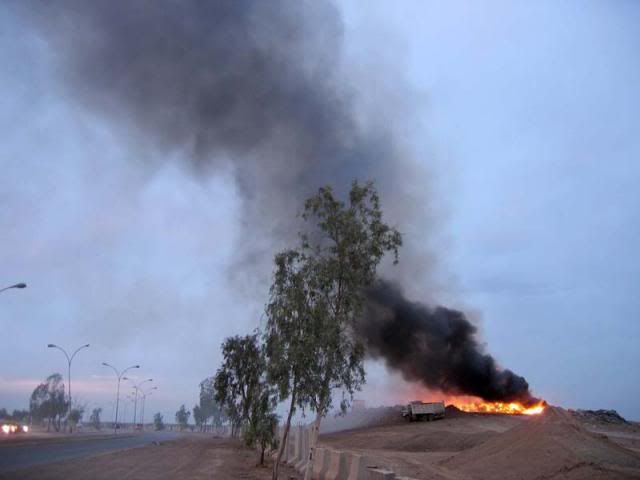“We biopsied several patients and found titanium in every single one of them,” said Anthony Szema, an assistant professor at Stony Brook School of Medicine who specializes in pulmonology and allergies. “It matched dust that we have collected from Camp Victory” in Iraq.
I wanted to get this information out there for everyone that has served in Iraq. Although I am not sure if the VA will test non-veterans, I would give it a try anyways. At least file a DBA if you have lung issues that you think came from your time in Iraq or even Afghanistan. If the VA is truly interested in finding trends and sources of this illness, it would be advisable for them to include the thousands of contractors who deployed in Iraq during those years. Either way, get yourself checked if think you need it.
Also, for DBA sake they should be testing contractors. The reason for that is they can plan for the coming claims, if it is found out that contractors are reporting lung illnesses. If there is an illness associated with serving in Iraq or Afghanistan, then contractors should absolutely get the same attention in these studies and treatment.
If you have a lung illness and think it was from serving in Iraq or Afghanistan, by all means make a comment below so others can read it. It mentioned that the metal dust found in the soldier’s lungs matched the same dust found at Camp Victory. There were also multiple camps in Iraq and Afghanistan that were burning trash daily. Balad airbase in Iraq burned 240 tons of trash a day!
With that said, this research and reporting reminds me of the Gulf War Illness studies back when I was in the service. That research is still ongoing and they are still trying to determine what caused Gulf War Illness. The article below also lists a registry you can sign up with if you served in the First Gulf War or in the most recent wars in Iraq. Get the world out guys and gals and pass this one around. –Matt
Study on Iraq dust here.
Register with the VA for Gulf War Registry Health Exam here.
* Veterans who served in the Gulf during the 1990-1991 Gulf War, Operation Desert Shield, Operation Desert Storm, Operation Iraqi Freedom, or Operation New Dawn are eligible for the Gulf War Registry exam. You do not need to be enrolled in VA health care to take part.
Register with the VA for Airborne Hazards and Burn Pit Registry here.
* Veterans who are eligible for the Gulf War Registry may also join the Airborne Hazards and Open Burn Pit Registry, which includes additional data related to airborne hazards.

Burn pit in Balad, Iraq.
New research links Iraq dust to ill soldiers
By Kelly Kennedy
June 2, 2014
Titanium and other metals found in dust at a base in Iraq have been linked to the dust found in six sick soldiers’ lungs, according to a study set to be released Monday.
“We biopsied several patients and found titanium in every single one of them,” said Anthony Szema, an assistant professor at Stony Brook School of Medicine who specializes in pulmonology and allergies. “It matched dust that we have collected from Camp Victory” in Iraq.
The dust is different from dust found elsewhere in that human lungs are unable to dispel it through natural immune-system processes. The Iraq dust comes attached to iron and copper, and it forms polarizable crystals in the lungs, Szema said. The particles — each bit 1/30th the size of a human hair — have sharp edges.
“They’ve inhaled metal,” Szema said. “It’s not a little; it’s a lot.”
(more…)